

by John Helmer, Moscow
@bears_with
Defence lawyers for Oleg Pulatov, one of the four men charged by the Dutch government with murder in the downing of Malaysia Airlines Flight MH17, have told the court the prosecutors were acting illegally in the case they have presented so far.
A lawyer for the 298 victims killed on board the aircraft, and their next of kin, also accused the prosecution of unlawfully keeping the evidence in the case file secret. No reporters for the international or Dutch media have published this part of the trial.
The Dutch Justice Ministry does not allow public release of the transcript of the proceedings, nor the livestream archive its cameramen have produced at the two days of hearing so far, March 9 and 10.
For the record and legal analysis of the March 9 hearing, dominated by presiding judge Hendrik Steenhuis, click to open. For the report of the prosecution claims on March 10, read this.
The video record of the defence lawyer, Sabine ten Doesschate, commencing her argument on March 10 can be viewed here, starting at Min 4:18:30.
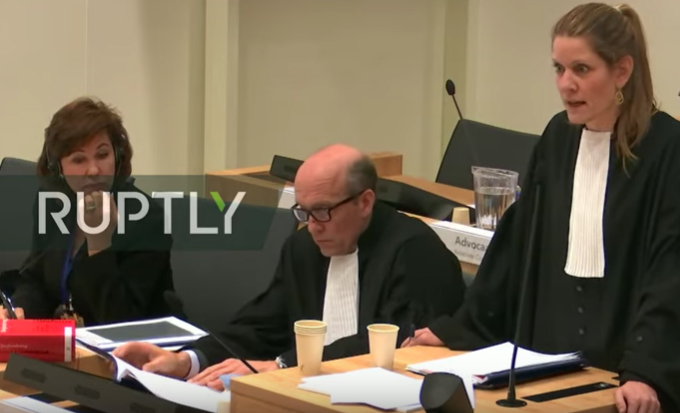
The defence counsel for Oleg Pulatov – left, Yelena Kutyina, the Russian attorney for the defence; centre, Boudewijn van Eijck; right (speaking), Sabine ten Doesschate.
The defence team comprises two Dutch lawyers from the Rotterdam criminal law specialist firm, Sjöcrona, van Stigt. Boudewijn van Eijck was one of the founders of the firm in 1992. Ten Doesschate joined the firm in 2016 and was promoted to partner a year ago. For details of the Russian lawyer, Yelena Kutyina, engaged in Pulatov’s defence, read this.
Ten Doesschate began by charging that everything attempted by the prosecution so far is premature and in violation of the Dutch Criminal Procedure Code. Worse, she said. The admissibility of the evidence in the prosecution’s case is doubtful, and so at this point in the proceedings, it cannot be accepted at face value, as the prosecutors have told the court.
Argument between the lawyers over what evidence can be accepted, or rejected, for completion of the case file are arguments over admissibility, as this is known in Anglo-American courts. For the moment, ten Doesschate told the court, this cannot be argued in court, and must wait until a new hearing, scheduled by Steenhuis on June 8, when the bench of three judges will rule.
“The case file received only a short while ago”, ten Doesschate said. “In view of this stock-taking nature, the position of the defence with regard to the requirements for further investigation should not be taken [now]. That can only be put forward in the pre-trial hearing [in June]…We simply cannot assess those questions [of admissibility and further investigation] at this stage” (Min 4:20:37).
Ten Doesschate accused the prosecutors of intentionally hobbling the defence by requiring the study of a case file amounting to more than 36,000 pages by a handful of lawyers, and to do so before June 8. “Contrary to the public prosecution the defence does not have dozens, or hundreds of employees who can do that work for them” (Min 4:21:04). She noted that the prosecution investigations have gone on for more than five and a half years, while now the prosecutors are demanding the defence take less than three months.
Ten Doesschate then attacked the prosecution for jumping the gun on the evidence for “excluding some scenarios of the shootdown” (Min 4:21:34). This was a reference to the conflict of evidence between the Russian BUK missile firing alleged by the Dutch Justice Ministry, police and prosecutors, and the Dutch military intelligence agency reports, based on US and NATO satellites and signals surveillance, from Major-General Onno Eichelsheim.
Another of the tasks, ten Doesschatwe insisted had not been lawfully carried out by the prosecutors, is “to find out which intercepted telephone conversations have been manipulated” (Min 4:21:50). Ten Doesschatwe was attacking prosecutor Dedy Woei-A-Tsoi for defending against the manipulation charge in a presentation earlier in the day.
Ten Doesschate then warned the court that the prosecution’s reliance on secret witnesses and secret evidence, both of them arranged by the Ukrainian Security Service (SBU), will be challenged. She cited the Criminal Procedure Code (CPC) Section 226B, which sets the rules in Dutch courts for the admissibility of secret witness testimony; and Section 301 which, if implemented, would require the SBU to testify in open court and provide its evidence for cross-examination by the defence:
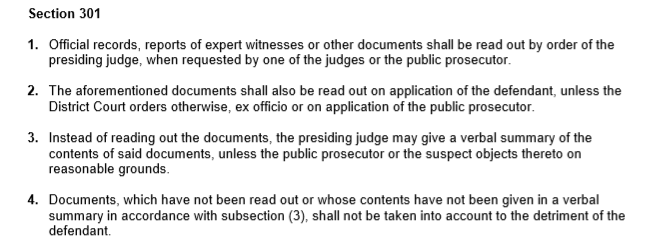
Source: http://www.ejtn.eu/
Ten Doesschate refused to address the evidential and argumentative points made earlier in court by the prosecutors because they were premature, prejudicial, and unlawful according to the CPC. “A hearing to take stock is not meant for that,” she concluded (Min 4:25:05).
Boudewijn van Eijck then began his presentation of the defence (Min 4:26:08). He attacked the prosecutors for their allegations on the reason for secrecy for witness identities. The prosecution’s presentation had been “rather sharp in its words” (4:26:44) which they were broadcasting to the world, the press, and to the court. “Does this befit a pre-trial hearing in which we take stock of the state of play, and also whether this fits due process” (4:27:35).
He also charged the prosecutors with putting undue pressure on the secret witnesses prepared by the SBU in Ukraine. Due process, van Eijk told the judges, should follow the procedures set down in the CPC Section 226B with closed-door hearings, magistrate rulings, and if need be, judgement on appeal. “We very much regret that this subject was discussed publicly now” (4:28:19).
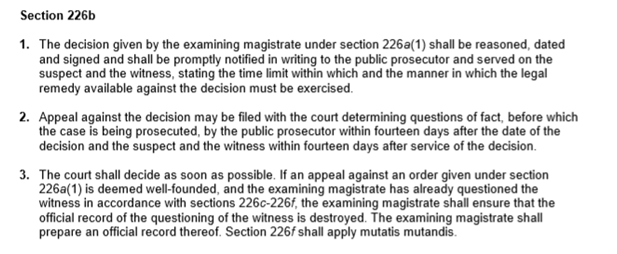
Source: http://www.ejtn.eu/
Van Eijk then attacked the prosecutors for publicly accusing the Russian state of trying to damage the trial with “disinformation”. The issue was irrelevant to the trial, he said. “Our client Mr Pulatov has nothing to do whatsoever with that [Russian state conduct] “ (Min 4:30:20).
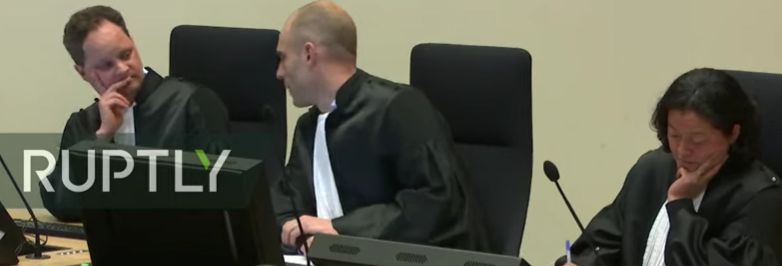
Under attack for illegal and improper public disclosure of secret witness testimony, Prosecutor Ward Ferdinandusse (centre) whispers to Prosecutor Thijs Berger (left), while Dedy Woei-A-Tsoi (right) writes notes (Min 4:28:19).
In court the defence lawyers refer to the defendant as “Mister Pulatov”. When he opened the trial on March 9 presiding judge Steenhuis called him “the accused Pulatov”. In their presentations the prosecutors did not refer to him except by his surname. The lack of courtroom courtesy was noticeable to international lawyers observing the proceeding. They comment that the judge and the prosecution are showing animus to an individual for whom, at this stage, Dutch law requires them to presume that he is innocent of the charges until proven.
Only after the defence launched its attack did prosecutor Ward Ferdinandusse, making his maiden speech in the proceeding, identify the defendant as “Mister Pulatov”(Min 4:32:31). He did that, however, as he opened a fresh attack on the defendant for wilfully evading a statement to the court when requested.
Ten Doesschate replied that Ferdinandusse was misrepresenting and trying to advance the case against Pulatov before the procedural law can be argued in June, and the judges decide. This was jumping the gun improperly and unlawfully, ten Doesschate said: “I’ve explained why we cannot decide that at this time”(Min. 4:35:42).
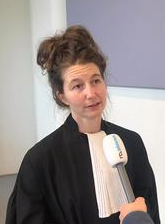
Arlette Schijns (right), counsel for the victims and next of kin, followed. She was sharply critical of the prosecutors for failing to disclose the case file as they are required to do, she told the judges, by Section 51B of the CPC. That section says: “At the victim’s request, the public prosecutor shall grant him permission to inspect the case documents of relevance to him. During the court hearing this leave shall be granted by the court of first instance, before which the case is being prosecuted, and for the rest by the public prosecutor.”
For the prosecutors to conceal the case file from the victims requires written authorisation by an examining magistrate, Schijns was reminding the court. The reason, she added, is that the victims and their next of kin have “a need to know the truth” (Min 4:43:24). Schijns is from a Dutch liability firm called Beer Advocaten. In October 2015 Beer advertised its interest in making money for the victims. For details, read this.











Leave a Reply